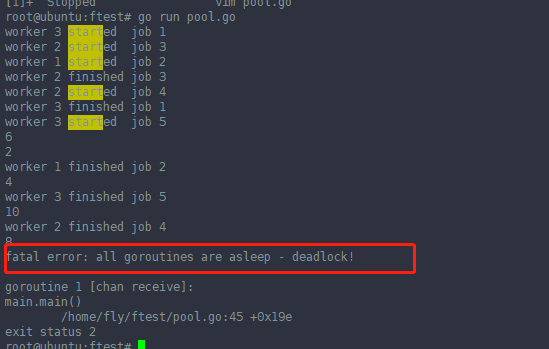【转】Go by Example: Worker Pools
原文:https://gobyexample.com/worker-pools
Our running program shows the 5 jobs being executed by various workers. The program only takes about 2 seconds despite doing about 5 seconds of total work because there are 3 workers operating concurrently.
1 2 3 4 5 6 7 8 9 10 11 12 13 14 15 16 17 18 19 20 21 22 23 24 25 26 27 28 29 30 31 32 33 34 35 | package mainimport ( "fmt" "time")func worker(id int, jobs <-chan int, results chan<- int) { for j := range jobs { fmt.Println("worker", id, "started job", j) time.Sleep(time.Second) fmt.Println("worker", id, "finished job", j) results <- j * 2 }}func main() { const numJobs = 5 jobs := make(chan int, numJobs) results := make(chan int, numJobs) for w := 1; w <= 3; w++ { go worker(w, jobs, results) } for j := 1; j <= numJobs; j++ { jobs <- j } close(jobs) for a := 1; a <= numJobs; a++ { <-results }} |
下面这个版本为什么会死锁呢??
1 2 3 4 5 6 7 8 9 10 11 12 13 14 15 16 17 18 19 20 21 22 23 24 25 26 27 28 29 30 31 32 33 34 35 36 37 38 39 40 41 42 43 44 45 46 47 48 | package mainimport "fmt"import "time"// Here's the worker, of which we'll run several// concurrent instances. These workers will receive// work on the `jobs` channel and send the corresponding// results on `results`. We'll sleep a second per job to// simulate an expensive task.func worker(id int, jobs <-chan int, results chan<- int) { for j := range jobs { fmt.Println("worker", id, "started job", j) time.Sleep(time.Second) fmt.Println("worker", id, "finished job", j) results <- j * 2 }}func main() { // In order to use our pool of workers we need to send // them work and collect their results. We make 2 // channels for this. jobs := make(chan int, 100) results := make(chan int, 100) // This starts up 3 workers, initially blocked // because there are no jobs yet. for w := 1; w <= 3; w++ { go worker(w, jobs, results) } // Here we send 5 `jobs` and then `close` that // channel to indicate that's all the work we have. for j := 1; j <= 5; j++ { jobs <- j } close(jobs) // Finally we collect all the results of the work. //for a := 1; a <= 5; a++ { // fmt.Println( <-results) //} for v := range results { fmt.Println(v) }} |

——————————————————————————————————————————————————————————
|
In this example we’ll look at how to implement a worker pool using goroutines and channels. |
|
 
package main
|
|
import (
"fmt"
"time"
)
|
|
|
Here’s the worker, of which we’ll run several concurrent instances. These workers will receive work on the |
func worker(id int, jobs <-chan int, results chan<- int) {
for j := range jobs {
fmt.Println("worker", id, "started job", j)
time.Sleep(time.Second)
fmt.Println("worker", id, "finished job", j)
results <- j * 2
}
}
|
func main() {
|
|
|
In order to use our pool of workers we need to send them work and collect their results. We make 2 channels for this. |
const numJobs = 5
jobs := make(chan int, numJobs)
results := make(chan int, numJobs)
|
|
This starts up 3 workers, initially blocked because there are no jobs yet. |
for w := 1; w <= 3; w++ {
go worker(w, jobs, results)
}
|
|
Here we send 5 |
for j := 1; j <= numJobs; j++ {
jobs <- j
}
close(jobs)
|
|
Finally we collect all the results of the work. This also ensures that the worker goroutines have finished. An alternative way to wait for multiple goroutines is to use a WaitGroup. |
for a := 1; a <= numJobs; a++ {
<-results
}
}
|
|
Our running program shows the 5 jobs being executed by various workers. The program only takes about 2 seconds despite doing about 5 seconds of total work because there are 3 workers operating concurrently. |




【推荐】国内首个AI IDE,深度理解中文开发场景,立即下载体验Trae
【推荐】编程新体验,更懂你的AI,立即体验豆包MarsCode编程助手
【推荐】抖音旗下AI助手豆包,你的智能百科全书,全免费不限次数
【推荐】轻量又高性能的 SSH 工具 IShell:AI 加持,快人一步